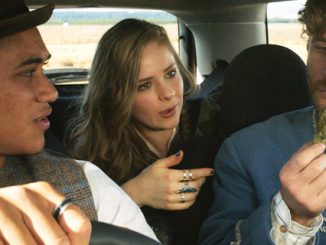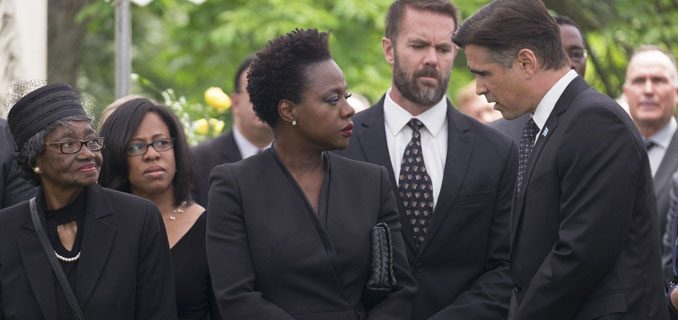
The week’s best arthouse release is also it’s most unlikely
Widows
Steve McQueen is hardly a director you’d expect to make a heist movie, but then Widows, which is co-written by Gone Girl’s Gillian Flynn is like no other heist movie you’ve ever seen. I looked at my watch 90 minutes in (not out of boredom, I was way too involved for that) wondering, “when was the heist stuff happening?” Where was all the plotting and planning? The glamorous unreal characters and the impossible clever-dick twists that made the over-hyped Ocean’s 8 so shallow and forgettable? And what sort of crime thriller has its female main characters meet and sweat naked in a sauna?
This tough and sinewy story originates from a British TV series from the 80s by Linda LaPlante, and not everything about its update to present-day Chicago works. Even the $5m haul that motivates its all-female crew (Viola Davis, Michelle Rodriguez, Elizabeth Debicki and Cynthia Erivo) seems too small, at least by contemporary movie standards. Although the glimpses we get of that racially and economically divided city, the all-pervasive menace and corruption and the hard-hard-scrabble lives of people ground down by poverty and violence are convincing enough. Those backgrounding scenes are the film’s strongest and make for the majority of the film’s 130 minutes, making it clear that McQueen – as in his other acclaimed films (Hunger, Shame and 12 Years a Slave) – is much more interested in political and social context than merely entertaining us with the jaunty conventions of a caper. Though he does do that too, eventually, with economical skill. This is indeed a hugely thrilling experience, though one probably more suited to discerning festival and arthouse audiences than the multiplex ones who’ll most likely see it.
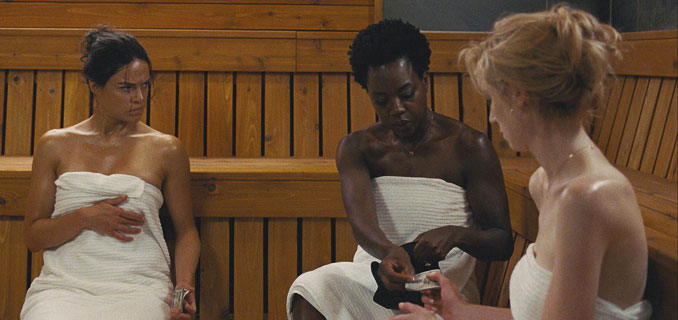
Widow-in-chief is Veronica (Davis), a respected Teacher Union rep who is saddled with a $2m debt her dodgy crime-boss husband Harry (Liam Neeson) had with a rival, also an aspiring politician (Bryan Tyree Henry). Harry’s explosive demise (and those of the husbands of the other women) at the beginning of the film leaves her at the mercy of a complicated web of corrupt politicians and murderous enforcers. The actions she takes in response form the bare bones of the gritty plot, but it’s the examination of how class, money and power interact in our cities (something also magnificently explored in The Wire at length) which makes Widows so exceptional. One of the politicians (Colin Farrell), in fact the owner of that 5 mil, is promoting the extension of Chicago’s Green Line metro, and his dynasty family just happens to be benefitting from the massive upscaling of land values along its route. That’s just a minor plot point, but its one that stuck with me when I walked out of the George St multiplex smack into the dead zone of the light rail construction, that odd and unnecessary project that adds no extra capacity to Sydney’s public transport system. And I wondered… Is Sydney like Chicago? You bet it is. MA15+ from Nov 22. Local cinemas include Palace Norton St, Central and Dendy Newtown ★★★★★
The Children Act
Ian McEwan is the sort of author who can be reliably expected to provide posh, tasteful, refined and high-minded fare for arthouse cinema audiences, and he doesn’t disappoint here… Unfortunately I’m not saying that in praise. Directed by Richard Eyre and adapted by McEwan, The Children Act stars the always outstanding Emma Thompson in a role which, to be brutally honest, is beneath her.
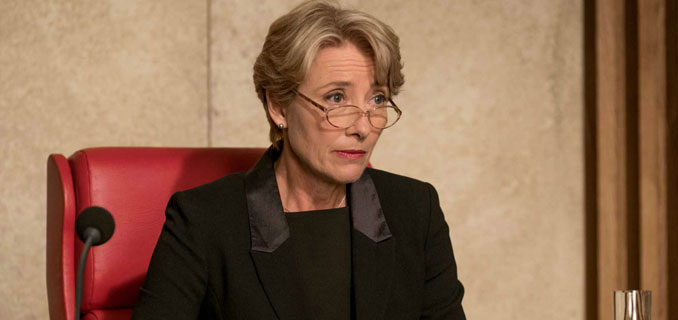
She plays Fiona Maye, an esteemed children’s court judge who always seems to get headline-grabbing, button-pushing cases to adjudicate on. Here it’s a 17-year-old boy called Adam (Fionn Whitehead) who with the backing of his family (Ben Chaplin) is refusing a life-saving blood transfusion on the basis of his Jehovah’s Witness faith. We’re supposed to like Fiona because not only is she ultra refined (she relaxes at her ever-so gentrified home reading poetry and playing classical music on a grand piano), but also terribly smart, hard-working, well-organised and doesn’t suffer fools lightly. Some of the film’s “humour” comes from her briskly slapping down unprepared barristers, her servile clerk “Nigel” and anyone not as clever as she is with cutting efficiency. Only someone as skilful as Thompson could make us empathise with such a haughty character, and we do, at least for a while… Though she also has an impossibly smug husband (Stanley Tucci – not so easy to like him) who has become fed-up with the lack of nooky in their arid and passionless marriage. Near the beginning he delivers a “your-job-or-our-marriage” ultimatum. She promptly kicks him out and changes the locks. Go girl, Fiona!
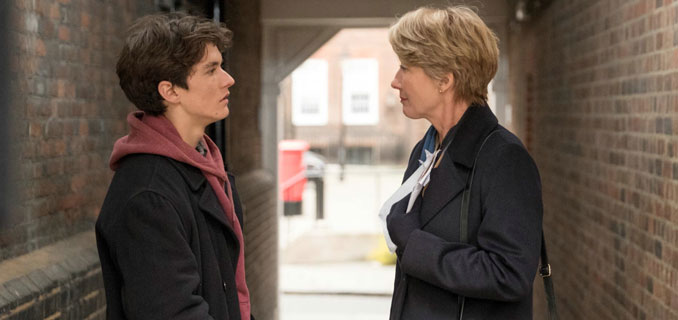
That last bit of plotting can only be there to account for what happens next. She meets up with Adam in hospital – he’s charming, precociously intelligent, as cultured and clever as she is plus he loves her music! That decides the case… Despite the legal teaser the trailer leaves tantalisingly dangling – her judgement is never in any doubt – the law is pretty clear on how it treats the rights of children. That bit of the story is over half way into the movie anyway, but it’s what happens next that’s so deeply problematic, and well… borderline creepy. Ok, McEwan is not an author afraid to get icky (On Chesil Beach), but the last half of the movie is just baffling. Many important issues are raised (the law vs the individual, faith and family, public vs private rights) in the film’s early sections and the story could have gone in any number of satisfying directions. It doesn’t, it just gets silly. And for those who want to ponder what it all means – its conservative message about childless working women will probably grate. M from Nov 22. Local cinemas include Palace Norton St and Central ★★★
Also opening this week
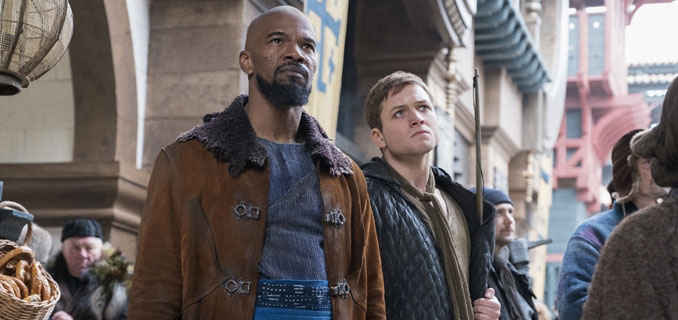
Robin Hood (at Palace Norton St and on wide release) and I Used to be Normal exclusive to Dendy Newtown – both un-previewed.
Reviews – Russell Edwards

